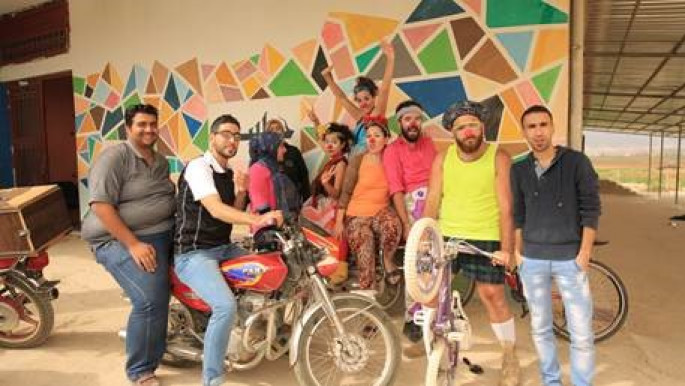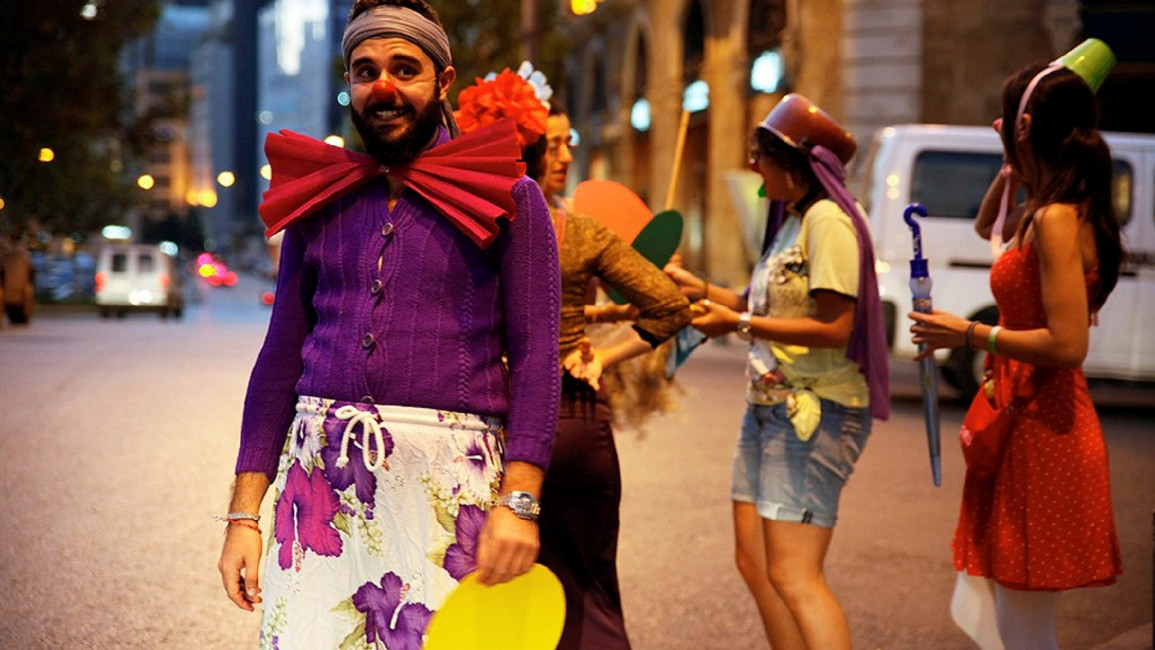
Isn't it funny? Beirut's clown activists tackle serious issues
The resourceful folk inhabiting the coastal and mountainous bizarro landscape of this tiny nation have responded in different ways.
Most recently, Lebanese youths came together in movements such as You Stink, We Want Accountability and other more radical iterations to push for some kind of change of the status quo.
They were galvanised by the deeply corrupt, but equally deeply entrenched, utter failure of the political class in addressing some fairly fundamental issues, including the (ongoing) garbage collection crisis.
The movements fizzled out. No one knows exactly why but sheer fatigue, fear of Arab Spring-style chaos, failure to inspire a critical mass of people and internal squabbling has since given the Lebanese establishment the last word over them.
Send in the clowns
"Love stinks," concludes Love and toxics in the air, a new tragicomic Valentine's Day-themed video made by activist-clown collective Clown Me In.
|
|
The video was shot in an unsanitary makeshift garbage dump, one of many the Lebanese government has been using since July last year in and around Beirut to dispose of the metropolis' waste, causing major health risks and environmental damage.
The clowns want to remind the Lebanese citizenry that despite, being out of their direct line of sight (and smell), they are still living with the garbage.
The video has already garnered some 25,000 views on the group's Facebook page.
The recurrent motif in the videos is how brilliantly (and sometimes annoyingly) matter-of-fact the Lebanese can be about things that would be enough to trigger riots, revolutions and even armed insurrections elsewhere.
A previous video that went viral parodied the Ministry of Tourisms Lebanon as never seen on TV campaign, which used GoPro shots and selfies to promote tourism in the country. The clowns went to a garbage mound in Beirut and shot a 360-degree tour using the same catchy music of the ministry's videos.
 |
The clowns are unconventional activists who use culture jamming, art and drama for activism, advocacy and therapy |  |
Clowns without Borders
The group, which comprises several performers, hopes culture jamming and street interventions can succeed where conventional activism has failed, in Lebanon and beyond.
 |
| Photo credit: Lichtspur Kino |
But unlike clown groups like the UK-based Clandestine Insurgent Rebel Clown Army (CIRCA) and Finland’s Loldiers of Odin (the parody answer to neo-Nazi group Soldiers of Odin), Clown Me In's ultimate focus is not politics, but people, vulnerable communities and the environment.
Sara Berjawi (Clown Ziza), an actress who joined the group in February 2014, told The New Arab that Clown Me In was the brainchild of "mother clown" Sabine Choucair, who founded the troupe in 2009.
Sabine, whose clown name is Flower, is a well-known social worker, performer and activist who is also member of the non-profit Clowns Without Borders group.
Clowns Without Borders often go to the Greek island of Lesvos, where they greet migrants and refugees arriving by sea.
 |
The clowns have worked with migrants and refugees, especially children desperately in need of a smile |  |
In character
"Being behind a mask means we can tackle issues in a different, non-preaching way," says Sara.
For this she never drops her guard while on clown duty. That is, except once, she says.
 |
During one of the You Stink protests the clowns were marching in, an old woman reached out, grabbed Sara’s red nose, and compared it crudely to the Lebanese prime minister's genitals.
"Ziza" had no choice but to burst out laughing, and broke out of character.
Though their interventions are not usually confrontational, they have had some brushes with the authorities.
In one stunt near Beirut's popular Gemmayzeh Street, they were followed by a plainclothes police informant who was filming them with a secret camera. One of the clown collective confronted him as he tried to find out what they were doing.
The clowns say the irony of the authorities' misguided priorities do not escape them - releasing armed militants with a slap on the wrist while obsessing over harmless stunts.
There was another encounter with the police; the clowns were trying to highlight the importance of respecting traffic lights, by dancing in front of cars stopped at red lights to congratulate their drivers.
A local traffic officer was not impressed, but since they were not breaking any laws, all he could tell them was that they should not be doing that in case a VIP convoy runs the red light and hits them...
"Exactly," the clowns say.
 |
Clown Me In uses satirical viral videos and street interventions to highlight social issues |  |
No laughing matter
In Lebanon, everything is turned into a butt of a joke, including bombs and war. When she sat at the end of the new video smoking shisha near a pile of garbage, people stopped and asked to join in.
 |
"It's not that the Lebanese people don't get irony," Sara says, "it's that they are cynical."
In another of their interventions, the clowns chased people who were littering on Hamra Street, and crowned them "king or queen of garbage". Most of the litterers laughed the mockery off.
But people generally respond well to their interventions.
The Clown Me In performer-activists have used art, storytelling, performances and viral videos from Lebanon, Jordan, Turkey and Morocco to Mexico, Brazil and Colombia.
They have worked with refugees, people with special needs, and vulnerable women and children to draw attention to different social and environmental issues, but also to deliver laughter therapy, a la Patch Adams.
Operating under the umbrella of production house Beirut DC, where they rehearse, the clowns have partnered up with groups including UN-Habitat, the International Rescue Committee, Handicap International, Mercy Corps and Women Now to deliver their projects.
Most of the clowns come from a social work, drama or theatre background, though their ranks include an architect.
Their next projects include a street theatre performance in partnership with the Minority Rights Group and performances in Palestinian and Syrian refugee camps in collaboration with the Swiss Embassy in Beirut.




